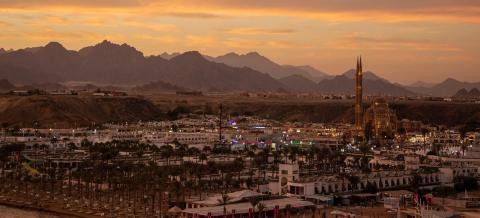
Navigating the energy transition: Search for common ground
Reflections from COP 26 and Africa Oil Week
The COP26 negotiations concluded in Glasgow with some progress on climate mitigation and adaptation. While some criticised that commitments fell short of those needed to keep global warming to 1.5C, there was clearer resolve to go beyond fossil fuel dependency, especially from OECD members of the Powering Past Coal Alliance and the Beyond Oil and Gas Alliance. Leaders of oil and gas companies were conspicuously absent from public platforms at COP26, even if present in large numbers as observers.
Yet even with such attention and resources focused on the climate challenge, COP26 did not address corruption risks and governance challenges head on. Experience from two decades of EITI implementation has shown that this focus is necessary to ensure that natural resources are used responsibly and in a way that promotes sustainable development.
Transparency is central to identifying common ground and developing shared perspectives to advance climate mitigation. In attending not only COP26, but also Africa Oil Week, the first in-person gathering of energy ministers since the start of the pandemic, we were reminded that transition for African states goes beyond swapping one energy source with another. Rather, it relates to the imperative of securing energy access to promote development. Transparency, accompanied by public debate, lays the framework to facilitate sustainable solutions that address energy needs, while progressing towards climate goals.
There are four distinct ways in which transparency, data and dialogue can help inform these debates.
Recognising energy needs
To address the climate challenge successfully, negotiators need to recognise the role of energy in poverty reduction and sustainable development in developing countries, especially those with substantial oil and gas revenues. For this group, reliance on revenues from oil and gas resources to meet development expenditures is a pressing reality. For countries with prospects of developing current reserves, the challenge is even greater. Governments in these countries have invested significantly in the sector and citizens hold high expectations for the dividend that their natural resources will bring.
These countries have strongly voiced their perspectives, and often believe their call for action on energy poverty goes unheeded. As the energy transition gathers momentum, their public statements indicate growing appreciation not only of the implications of long-term decline in demand for fossil fuels, but also the growing potential of the renewable sector to address energy needs.
The EITI is supporting the generation of relevant data to aid policy makers to plan for long-term energy needs, increasingly from lower priced and competitive renewables, as an integral element in its energy transition work. It is also seeking to promote dialogue through its multi-stakeholder structure that brings together government, civil society and industry, including national oil companies. An initial meeting of African energy ministers resulted in a consensus document and recommendations.
The key lies in scaling resources and investment to boost the energy transition. But an inflow of funds will not itself resolve challenges of energy access. While data is needed to help inform policies in both producing and consuming countries, transparency can also help spur debate on the role of industrialised countries in supporting the energy transition in Africa.
Rich countries are committing more resources to support fossil fuel dependent countries to move away from coal, oil and gas and build renewable energy capacity. A notable example was the USD 8.5 billion awarded to South Africa to end coal production. This kind of investment needs to ratchet up quickly to benefit other low-income producers, in a way that is transparent and equitable. The award prompted much debate, particularly in other African countries which have similar dependence on fossil fuels but much more limited access to energy.
Promoting public dialogue
Second, there is scope to achieve greater commonality of interests by facilitating greater public dialogue around the energy transition in developing countries. This requires efforts to build bridges between climate negotiators in environment ministries with mainstream energy ministers, including those responsible for hydrocarbons and meeting national energy needs.
Effective dialogue on building shared goals requires good data and analysis which is often lacking in producer countries. There is keen appetite from policy makers in these countries for data that models fiscal trends and revenues data from the fossil fuels sector. Such data helps to pinpoint risks of declining revenue and stranded assets that may not be productive in the longer term.
Making industry a part of the solution
A third area of potential convergence, which remains far removed from current reality, is acknowledgement of the changing priorities of oil and gas companies, especially the national oil companies that produce most of the world’s oil. A number of multinational energy companies are changing their investment profile with net zero targets and diversifying into renewables. For the past decade, the Danish energy company Ørsted (formerly Danish Oil and Natural Gas) has pursued a strategy of net zero emissions, and by 2020 had become the largest producer of offshore wind power with an investment portfolio mainly consisting of renewable energy. Other European oil and gas companies, many of them EITI supporters, are pursuing similar diversification strategies with ambitious net zero targets, even though these commitments are frequently met with scepticism by climate activists who demand a complete halt to fossil fuel production.
Excluding industry voices from COP discussions around ending fossil fuel subsidies and fresh exploration risks limiting the scope for identifying common ground on long-term climate and energy policy solutions. Similarly, producer countries and national oil and gas companies need to accelerate efforts to engage with the energy transition and contribute positively to global climate goals. The EITI’s annual SOE Summit, which took place earlier this month, saw several representatives from national oil and gas companies indicating they have begun developing energy transition strategies to ensure they remain competitive.
Taking corruption seriously
The fourth area of potential convergence lies in taking corruption risk seriously. The rush to green energy and financing may come at the risk overlooking the possibility of unscrupulous actors entering the renewables sector, by influencing licensing deals in wind and solar and cementing favourable deals that favour vested interests. Large-scale investment in wind and solar requires increasing volumes of strategic minerals, often from countries with severe governance challenges. These risks are similar to those encountered by oil, gas and mining companies in planning large-scale investments and negotiating contracts, even if the sector is different.
But, despite some notable exceptions, both green investors and some oil and gas companies appear oblivious to such risks. The changing nature of the energy sector could simply shift risk, with significant implications for addressing energy needs of developing countries, unless governance challenges are acknowledged and addressed. This is a key element in EITI’s energy transition strategy: working with companies producing renewable energy and strategic minerals to identify and mitigate corruption risk through EITI reporting and data. To this end, transparency can help identify vested interests and contracts that are incompatible with climate commitments.



